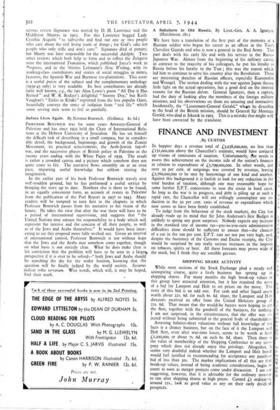FINANCE AND INVESTMENT
By CUSTOS
IN happier days a revenue total of £3,038,000,000, no less than LI31,000,000 above the Chancellor's estimate, would have conjured up visions of remissions of taxation. Unfortunately, doe needs to assess this achievement on the income side of the nation's finances in relation to expenditure of £5,799,000,000. In other words, just over 5o per cent, of outgoings was covered by revenue, leaving £2,760,000,000 to be met by borrowings of one kind and another. Against this background it is foolish to look for any reduction in the total burden of taxation, although one may reasonably hope for some further E.P.T. concessions to ease the strain in hard cases. So long as the war is in progress, and debt is piling up at such a rapid rate, the Chancellor will not willingly contemplate any re- duction in the so per cent. ratio of revenue to expenditure which now seems to have been firmly established.
To judge from the behaviour of the stock markets, the City has already made up its mind that Sir John Anderson's first Budget is unlikely to spring any great surprises. Nobody expects any increase in the standard rate of income tax—pay-as-you-earn administrative difficulties alone should be sufficient to ensure that—the chances of a cut in the too per cent. E.P.T. rate are not put very high, and, despite the buoyancy of the Customs and Excise receipts, the City would be surprised by any really serious increases in the imposts on tobacco, spirits or beer. All these forecasts may prove wide of the mark, but I think they arc sensible guesses.
SHIPPING SHARE ACTIVITY
While most sections of the Stock Exchange plod a steady and uninspiring course, quite a lively business has sprung up in shipping shares. For many months the high break-up values in this group have attracted attention, but it has required the news of a bid for Lamport and Holt to set prices, on the move. The story of this bid is an odd one. For cash and other liquid assets worth about 22s. 6d. for each 6s. 8d. share, the Lamport and Holt directors received an offer from the United Molasses group of 22s. 6d. That meant that the would-be buyers were hoping to get the fleet, together with the goodwill of the business, for nothing. I am not surprised, in the circumstances, that the offer was re- jected without being submitted to the general body of shareholders. Assessing balance-sheet valuations without full knowledge of the facts is a chancy business, but on the face of it the Lamport and Holt fleet, even after war-time losses, seems to be worth at least £r,000,000, or about 7s. 6d. on each 6s. 8d. share. Then there is. the value of membership of the Shipping Conference to any com- pany which does not already enjoy this privilege. Altogether, it seems very doubtful indeed whether the Lamport and Holt board would feel justified in recommending for acceptance any purchase bid of less than 3os. The market implications of all this are that break-up values, instead of being academic considerations, begin to count as soon as merger projects come under discussion. I am not suggesting, however, that it is advisable for the ordinary investor to run after shipping shares at high prices. Cunard Li ordinaries, around 25s., look as good value as any on their early dividend prospects.


























 Previous page
Previous page